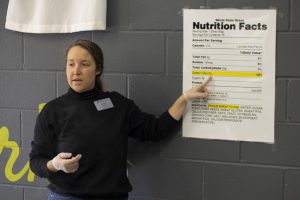
by Samantha Kennedy | Aug 26, 2022
WARNING: This article describes the signs, symptoms, and statistics of mental health challenges, particularly suicide, which may be triggering or unsuitable for some readers. Reader discretion advised.
The United States is currently experiencing a mental health crisis. The isolation and confusion of the recent pandemic brought to light an astounding number of people living with depression, anxiety, and other mental health and substance use challenges. While many of these people have been dealing with these challenges since before the pandemic, the sheer scope of the crisis has been brought into sharper focus since the onset of COVID-19.
One of the most difficult mental health issues to talk about is suicide. For many people who struggle with suicidal thoughts or for the families of those who die by suicide, it can be very painful and stigmatizing to discuss. Even for those outside those two groups, suicide is often a taboo subject.

Supporting someone during a mental health challenge is just as important as supporting them during a physical challenge. By working together, we can help reduce the stigma of mental illness. (Photo source: UF/IFAS File Photo)
According to the Centers for Disease Control and Prevention (CDC), the overall suicide rate in the U.S. decreased 3% during the pandemic despite the fact that calls to suicide hotlines went up nearly 800%. For me, what this shows is that when people suffering from suicidal ideation reach out to the resources available to them, they improve their chances for a better outcome.
The National Alliance on Mental Illness (NAMI) shares these statistics on their website: 79% of all people who die by suicide are male; suicide is the second leading cause of death among people aged 10-34 and the 12th leading cause of death overall in the U.S.; 18.8% of high school students and 11.3% of young adults aged 18-25 experience suicidal ideation each year.
When a person dies by or attempts suicide, those left behind often claim they did not see it coming, that they had no idea their loved one was having suicidal thoughts. In many cases, the person experiencing suicidal ideation conceals their thoughts and feelings from those around them. However, there are certain warning signs that may be observed in people experiencing suicidal thoughts.
The American Foundation for Suicide Prevention (AFSP) lists the following warning signs: talking about wanting to die or to kill oneself; looking for a way to kill oneself; talking about feeling hopeless or having no purpose; talking about feeling trapped or being in unbearable pain; talking about being a burden to others; increasing the use of alcohol or drugs; acting anxious, agitated, or reckless; sleeping too little or too much; withdrawing or feeling isolated; showing rage or talking about seeking revenge; and displaying extreme mood swings.
(Please note this is not an exhaustive list, but these signs may be indicators that a person may be in acute danger and may urgently need help.)
September is Suicide Prevention Awareness Month. While suicide prevention is important every day of the year, I encourage everyone to take some time this month to learn more about mental illness and suicide. Taking the time to increase your awareness will help reduce the stigma of mental illness and suicide and may allow you to support someone experiencing a mental health challenge.
If you or someone you know is experiencing a mental health crisis, please call or text 988 or text TALK to 741741.
UF/IFAS is an Equal Opportunity Institution.

by Gretchen Thornton | Apr 28, 2022
You play a significant role in loving your heart by developing a healthy lifestyle that will last a lifetime. Do you know a heart beats about 2.5 billion times over the average lifespan? The heart’s never-ending workload is like a love between a mother and her daughter. A mother and daughter will have bumps during their lifespans, such as teenage rebellion, a fight for independence, and the battle to become a woman. The love for your heart can also have bumps during your lifespan, such as poor diet, lack of exercise, smoking, unlucky genes, and much more.
As human beings, we all have our favorite go-to food or foods. My mother and I love to eat chips. We need to focus on eating various healthy foods. MyPlate can show how everybody can make food choices for a healthy diet. Each food group provides energy and almost every nutrient we need. No one food group is more important than the other. For good health and proper growth, individuals need to eat various types of food every day. By eating healthy, you love your heart. My mother and I should replace the chips for fruits during the day for a healthy snack.
Exercising is an essential step in loving your heart. When I was growing up, my mother and I would clean the house on Saturday mornings. The fun thing about cleaning was listening to a favorite song while dancing in the living room. Physical activities are a great tool to help you stay active during your lifespan. A person should aim for 30 minutes of moderate physical activity each day. Young children should participate in 60 minutes of physical activity a day. In 2022, love your heart by “KEEP MOVING!” and check out the Let’s Walk Florida program at your local Extension Office.
Atherosclerosis is a condition in which your arteries narrow and harden due to the buildup of fats in the artery wall. There are chemicals found in tobacco smoke that can harm your blood cells. The chemicals can damage the function of your heart and blood vessels. When this happens, you do not love your heart, and you can risk atherosclerosis. I will say, my mother and other family members are tobacco users. Each year, over 1 million Americans quit smoking. You can use many strategies to stop using tobacco, such as going to a behavior support group, breathing exercises, healthy snacks, remembering your smoking triggers, and remembering that you are saving money. Reminder: give your heart a huge hug by stopping using tobacco.

The Love for a Mother through Heart Surgery. Photo source: Gretchen Thornton
Do you know that many types of heart disease are passed down through the “Family Tree?” Heart disease can affect the heart muscle and electrical system and cause high cholesterol levels. There is much to learn about the connection between genes and heart disease within a family. Researchers continue to learn about the outcomes of the connections between the two. Communication is an essential tool to keep your family tree healthy. My mother had a heart attack when she was 60 years old. She went to the hospital for a low oxygen level due to allergies. The doctor noticed that she had a heart attack in her past. She has a pacemaker and cardioverter-defibrillator to help with her heart rhythm now. During this stage of my life, I make sure that I schedule my yearly wellness check doctor’s appointment. Love your “Family Tree” by communicating about your health history because your family grows from the same seed.
You may think it is too early to think about heart health in children. Heart disease can start early in life. A healthy lifestyle can decrease the risk of developing cardiovascular disease later in life. A child that is living a healthy life can listen and participate in school, sleep at night, have healthy bones and muscles, increase self-esteem, and adopt a lifelong habit.
Loving your heart may not be straightforward at times. A healthy lifestyle is a day-to-day process that takes time and hard work. Loving your heart is unique because we all share the same common goal to live a healthy life. In 2022, remember to follow MyPlate.gov and eat healthily. Each day, turn the television off and exercise for at least 30 minutes. Make this year tobacco-free; learn the benefits of quitting by contacting Tobacco Free Florida for more information. Spending time with your family is an excellent time to communicate about family health history and genetics. For more information about heart health, contact your local doctor about how you can become more heart-healthy.
Resource:
FSHN20-56/FS426: Reducing Your Risk for Heart Disease: The Power of Food (ufl.edu)
References:
Genetics of Congenital Heart Disease | Circulation Research (ahajournals.org)
Tobacco Free Florida | Smoking Cessation Information & Programs

by Samantha Kennedy | Apr 22, 2022

Prudence Caskey, Santa Rosa County 4-H Agent. Photo source: UF/IFAS
Written by Prudence Caskey, Extension Agent II – 4-H Youth Development, UF/IFAS Extension Santa Rosa County
The hot Florida summer is approaching, and we all need to make sure we focus on hydration in the heat. Dehydration is very common in hot, humid environments. Many people do not drink the recommended amount of water. Many of us have our coffee in the morning and unless we go out to lunch and someone gives us water, we seldom think about water during the day. Another confusing concept is how much water we should drink. Growing up, we were told to get eight glasses of water a day. That is 64 ounces. Let’s see if that adage still holds true today.
How much water should I drink?
The best way to calculate how many ounces of water to drink is to multiply your weight by .67 or 67%. For example, a person weighing 150 pounds would need 100½ ounces or a little over 12½ cups. On the other hand, a person weighing 200 pounds would need 134 ounces or 16¾ cups.
Is that all the water I need?
No, as you sweat, you lose the water you have already consumed. If you are sweating for 30 minutes, you need to replenish your hydration with 12 additional ounces of fluid.
What fluid should I drink?
The main thing to remember when it comes to hydration is, just because it is wet does not mean you are being hydrated. Different fluids are absorbed by our bodies differently. Some alcoholic beverages remove hydration from our bodies as we drink them. Below is an example of how our bodies absorb some common beverages:
- Water absorbed at 100%
- Sparkling Water absorbed at 100%
- Skim Milk absorbed at 90%
- Buttermilk absorbed at 90%
- Whole Milk absorbed at 80%
- Apple Juice absorbed at 88%
- Decaffeinated Coffee absorbed at 90%
- Coffee absorbed at 80%
- Sports Drinks absorbed at 50%
- Energy Drink absorbed at 40%
- Wine absorbed at negative 150%
- Beer absorbed at negative 60%
- Sake absorbed at negative 180%

Staying hydrated in the heat of summer is an important part of sun safety. (Photo source: UF/IFAS File Photo)
- Liquor absorbed at negative 300%
This is a huge concept to grasp if you plan on being out at the beach with your friends this summer. With this example, a well-hydrated 150-pound person consumes the required 100½ ounces of fluid. Then, at a gathering, they have three glasses of wine. The standard five ounces per glass would mean they have removed 22½ ounces from their hydration after drinking only 15 ounces of wine. Be cognizant of what you add to your coolers this year.
What are the signs of dehydration?
There are many signs our bodies will give us to signal dehydration. Headache, nausea, and muscle pains are common. However, the most common sign of dehydration is thirst. That’s right, if you are thirsty, it is your body’s way of letting you know you need fluids. Just be careful which fluids you choose this summer when you are out enjoying the Florida sun.
Learn more at: https://edis.ifas.ufl.edu/publication/FY1409
UF/IFAS is an Equal Opportunity Institution.

by Samantha Kennedy | Apr 4, 2022
“Stressed is just desserts spelled backwards.” When I was younger, I took this saying to heart. If I was stressed, I reached for the sweets. That instant rush of sugar to my brain provided a feeling of happiness and contentment. But it was only temporary. Once the sugar high wore off, I went back to feeling overwhelmed with stress, which just made me reach for more sweets.
It took me much too long to realize this was an endless and unhealthy cycle. Stress eating, especially stress-eating junk food, was such an ingrained habit for me, I did not even think about it having negative consequences such as weight gain and high blood sugar, both of which can be exacerbated by stress itself.
More recently, I have taken an interest in healthier coping strategies. Stress is an inevitable and integral part of our lives. We cannot avoid it. But we can seek ways to deal with it that do not add even more stress (or calories) to our body. One of the most helpful strategies I have adopted to cope with stress is to strive to live more mindfully.

Spending time in nature has been shown to decrease feelings of stress, lower blood pressure, and increase feelings of calm. (Photo source: UF/IFAS File Photo)
Mindfulness has become a bit of a buzzword over the last few years, but do not let that trick you into thinking it is just a fad. Mindfulness and everything it entails has been around for decades (even longer!). Practices such as mindful breathing, tai chi, and meditation are all part of mindfulness, which is simply an umbrella term used to describe strategies for dealing with difficult emotions, managing stress, and staying present in everyday life.
One of the things I have found most valuable in my foray into mindfulness is the ability to better recognize the signs of stress in my body. Early recognition of stress signals allows me to put one of my new mindfulness skills into practice to combat their effects. This may include simply pausing for a few moments and consciously breathing or taking a short walk in the sunshine while allowing the sounds around me, and not my stressful thoughts, to become the focus of my attention.
Another good practice for stress reduction in general is to immerse yourself in nature whenever possible. Whether that is hiking one of the many local nature trails, kayaking in the springs, or relaxing at the beach while listening to the waves, spending time in nature has been shown to alleviate stress. Even watching a brief nature video online has been shown to lower blood pressure and elicit feelings of calm.
April is Stress Awareness Month. I challenge everyone to take some time this month to really think about what stress looks like for you and how it shows up in your mind and body. How do you usually cope with it? If the answer involves over-indulgence in a substance such as food or alcohol, I urge you to try a new, healthier way to cope. Go for a walk. Focus on your breath. Even try meditation with the help of a mindfulness mobile app. It may feel weird at first, but if you keep at it, it will soon become a new healthy habit that you will reach for instead of that bag of chips.
UF/IFAS is an Equal Opportunity Institution.

by Claire Davis | Jan 13, 2022

Being more active is one of the top New Year’s Resolutions.
Photo credit: UF/IFAS Photo: Sally Lanigan.
Well, it’s that time of year again. January 1st has finally rolled around and I still have not completed last year’s New Year’s Resolution. If you’re like me, your resolution is to lose weight in 2022. Maybe you have chosen to quit smoking, exercise more, or try to be more positive. Maybe these resolutions sound familiar to you because they were last year’s resolutions, too!
You don’t have a New Year’s Resolution yet? Below is a list of some of the most common New Year’s Resolutions that could help you spark an idea!
-

Exercising with others can help you stay on track to reach your wellness goals.
Photo credit: UF/IFAS Photo: Josh Wickham.
Exercise more
- Lose weight
- Get organized
- Learn a new skill or hobby
- Save more money
- Quit the use of tobacco
- Quit the use of alcohol
- Spend more time with family and friends
- Travel more
- Read more
So, how do you ensure that you are going to stick to your resolution? Below are a few New Year’s Resolution tips to help us create long-lasting change:
- Dream big! The bigger, the better. Do you want to learn to run a marathon? Do you want to fit back into those jeans you wore in high school? Being ambitious will help inspire others around you to cheer you on toward those goals.
- Break that big dream down into smaller pieces. Running 26 miles seems daunting, but when you start with just walking 1 mile, you will soon gain the confidence to push for more. Choosing to reach for healthier snacks, such as carrots or celery instead of potato chips, is a small change that can affect your diet. You do not have to deprive yourself of foods you enjoy to lose weight. You just have to focus on portion control. Small steps will move you forward to your ultimate goal.
- Commit yourself to your goals! Write them down, post your goals on social media, or verbally promise to others that you are going to do it. Hold yourself accountable to what you are trying to do. Sometimes, making a public announcement will encourage others to join you on your journey. They can push you to be the best version of yourself, while also holding you accountable.
- Give yourself a pat on the back! “Rome wasn’t built in a day.” Well, neither will you accomplish your end goal in one day. Typically, our new year’s resolutions take time, sometimes a very long time. Encourage yourself to keep going by acknowledging what you do accomplish!
- Learn from your past. I am not perfect, you are not perfect, no one is perfect! We all stumble at times, but it is how we recover that will set us up for success or failure. If you “fall off the healthy-eating train” one evening, don’t beat yourself up or give up. Tomorrow is a new day, and you can resolve to recover from your mistakes to get back on track.
- Support! I have mentioned inspiring others already, but you need support, too. Accept help from those who care about you to help you achieve your goals. Consider joining a support group, such as a workout class at the gym or a group of co-workers to quit smoking. These individuals share your struggles and want to see you succeed, which makes the challenge less intimidating!
- The 3 R’s: Reflect, Replace, and Reinforce. The 3 R’s can help you make a long-term change. Reflect on your current situation, i.e. eating habits. Replace those unhealthy habits with healthier ones. Reinforce these changes in your daily life.

Use the Nutrition Facts label to make healthy food choices.
Photo credit: UF/IFAS.
According to the American Psychological Association, “By making your resolutions realistic, there is a greater chance that you will keep them throughout the year, incorporating healthy behavior into your every day life.” The dreaded New Year’s Resolution does not have to seem unattainable. If you plan to make a New Year’s Resolution this year, limit the number of resolutions you choose so that you can focus on them. By creating new habits and making small changes, you can do anything you put your mind to!
Sources:
https://www.health.harvard.edu/staying-healthy/seven-steps-for-making-your-new-years-resolutions-stick
https://www.apa.org/topics/behavioral-health/new-year-resolutions
https://www.dhs.gov/employee-resources/blog/2020/01/07/new-years-resolutions

by Julie McMillian | Jan 13, 2022

Trees help to clean the air and provide a relaxing setting to reduce stress.
Photo credit: Anitra Mayhann
Do you know how vital trees really are? Trees conserve soil and water and clean the air. Research has shown that there are both mental and physical health benefits from forests. Trees provide us with oxygen through photosynthesis. Not to mention, think of the beauty they add to an area. Florida has celebrated Arbor Day for many years, since 1886 to be exact. It is the third Friday in January, whereas the National Arbor Day is the last Friday in April.
We can improve our health just by spending time outside in nature. Forests and trees can boost our immune system, reduce stress, increase our ability to sleep as well as boost energy levels while improving mood and helping us to focus. Studies in health care show a link between nature and health. Plants put off airborne chemicals called phytoncides to repel insects. The antifungal and antibacterial qualities that are put off in this process help us as we breathe them in by increasing our white blood cell count.
It is important that we remove ourselves occasionally from our office or home to explore green spaces to take a mental break. That might mean a walk in the forest, gardening, exercising, or resting and meditating to unplug from our fast-paced busy life. Many doctors encourage and incorporate this type of therapy for wellness for their patients and for children diagnosed with attention deficit disorder.
There are many ways to celebrate trees. They are a great gift for birthdays, holidays, or anniversaries. You might also consider planting a tree in honor of a family member who has passed on or to remember a beloved pet. This year, give a gift that gives back as well as be encouraged to celebrate Florida’s Arbor Day on January 21st, 2022.
Many holidays celebrate something we remember, but Arbor Day is a way to celebrate hope for the future by planting a tree to support a healthy community. I encourage you to check with your local government offices, Forrester, or Extension office to see if there are any special celebrations planned that you could join or plan your own activity to honor trees as a resource and how they impact your environment.
For more information, visit Arbor Day Foundation or Florida Urban and Community Forestry.















